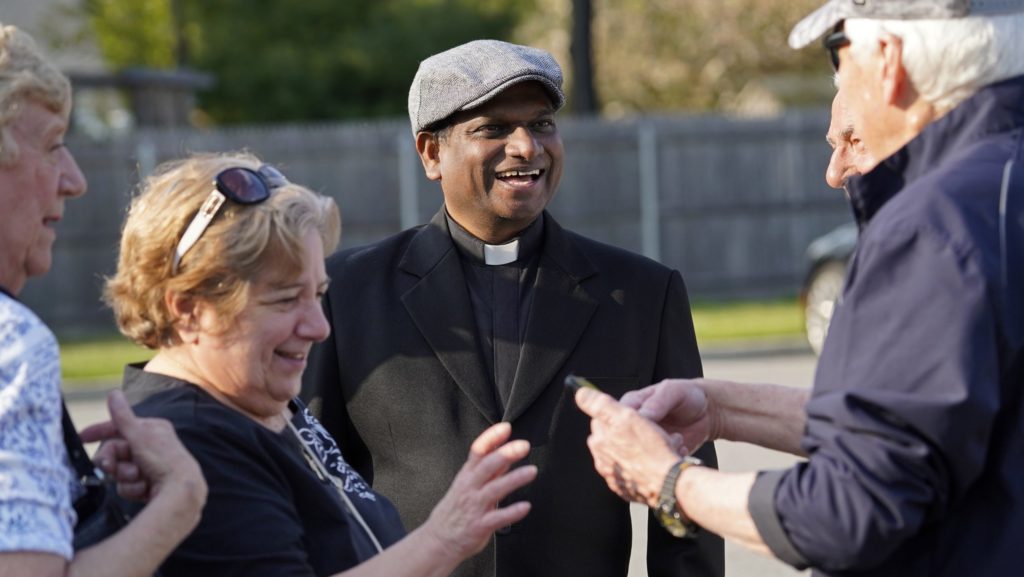The U.S. bishops on April 10 told congressional lawmakers they support bipartisan legislation that would ease some immigration restrictions on religious workers from other countries, allowing them to stay in the U.S. while they wait for permanent residency.
The legislation, titled the Religious Workforce Protection Act, was introduced in the Senate by Sens. Susan Collins, R-Maine, Tim Kaine, D-Va., and Jim Risch, R-Idaho, and in the House by Reps. Mike Carey, R-Ohio, and Richard Neal, D-Mass.
If signed into law, it would permit religious workers already in the U.S. on temporary R-1 status with pending EB-4 applications to stay in the U.S. while waiting for permanent residency, Collins' office said. All five of those members are Catholic.
"When Maine parishes where I attend Mass started losing their priests, I saw this issue creating a real crisis in our state," Collins said in an April 8 statement. "Recently, three Catholic parishes in rural Maine — Saint Agatha, Bucksport, and Greenville — were left without priests for months because their R-1 visas expired while their EB-4 applications were still pending."
The National Study of Catholic Priests — released in 2022 by The Catholic University of America's Catholic Project — indicated 24% of priests serving in the U.S. are foreign-born. A majority of these were ordained outside the U.S., while others are foreign-born priests who came to the U.S. as seminarians, were ordained in the U.S. and are also subject to visa renewals.
"Our bill would help religious workers of all faith traditions continue to live and serve here in the United States while their applications for permanent residency are being fully processed," Collins said. "Many Mainers and Americans cannot imagine their lives without the sense of community and services their local religious organizations provide -- with this legislation, I hope they never have to."
Kaine likewise said in a statement, "I first started hearing about churches losing trusted priests through my Parish, St. Elizabeth's in Richmond, where we have had priests who were immigrants, and often have visiting priests, some of whom are immigrants as well."
"But as it turns out, this problem is not unique to Virginia — it's impacting religious congregations of many faiths, all across the country," he said.
Bishops Mark J. Seitz of El Paso, Texas, Barry C. Knestout of Richmond, Virginia, James T. Ruggieri of Portland, Maine, and Earl K. Fernandes of Columbus, Ohio, were among the religious leaders who offered statements of support for the bill in press releases from Collins and Kaine's offices, alongside representatives of evangelical Christian, Muslim, Jewish, and Hindu organizations.
In an April 10 letter to members of Congress, Archbishop Timothy P. Broglio, president of the U.S. Conference of Catholic Bishops and head of the U.S. Archdiocese for the Military Services, as well as Bishop Seitz, who is chairman of the USCCB's Committee on Migration, urged lawmakers to pass the legislation to "to ensure communities across our nation can continue to enjoy the essential contributions of foreign-born religious workers who lawfully entered the United States on a nonimmigrant religious worker (R-1) visa."
They said that there are many Catholic priests, women religious, and laypersons working in Catholic ministries in that category.
"Some parishes, especially those in rural or isolated areas, would go without regular access to the sacraments, if not for these religious workers," the bishops said. "Additionally, dioceses with large immigrant populations rely on foreign-born religious workers for their linguistic and cultural expertise. We would not be able to serve our diverse flocks, which reflect the rich tapestry of our society overall, without the faithful men and women who come to serve through the Religious Worker Visa Program."
They said, "Simply put, an increasing number of American families will be unable to practice the basic tenets of their faith if this situation is not addressed soon. Likewise, hospitals will go without chaplains, schools will go without teachers, and seminaries will go without instructors."
The bishops urged lawmakers to cosponsor "this vital measure and to work toward its immediate passage, thereby furthering the free exercise of religion in our country for the benefit of all Americans."

